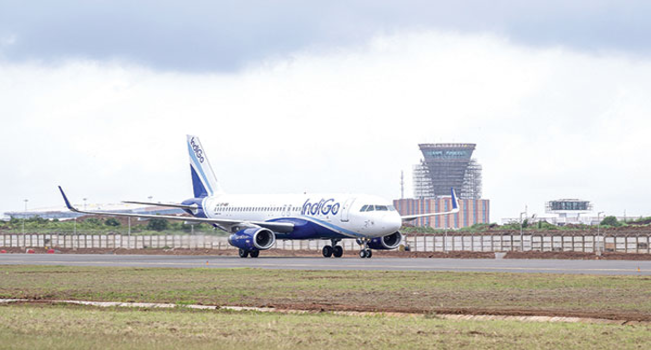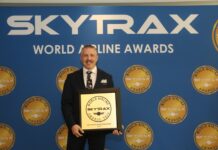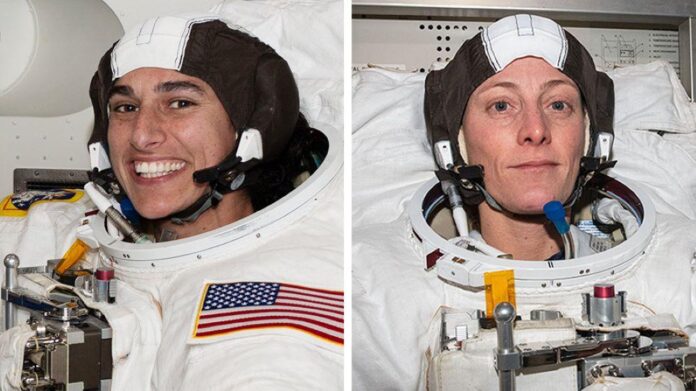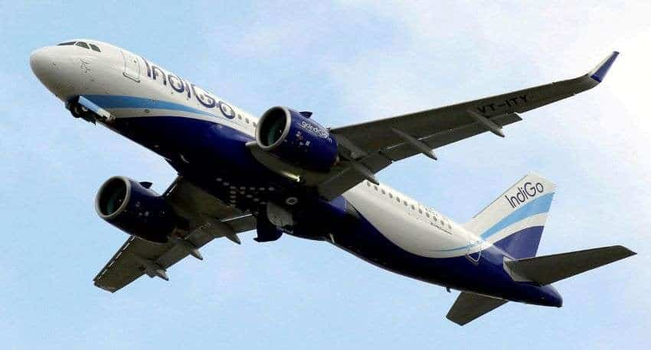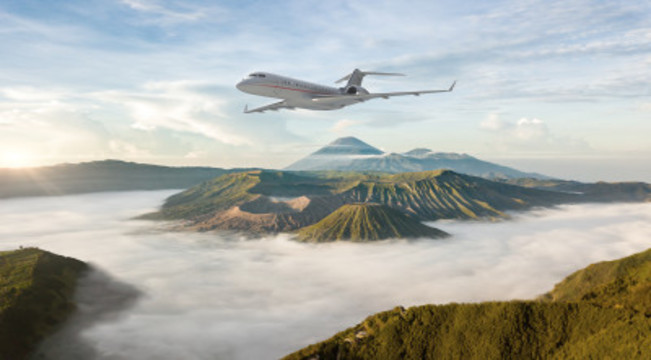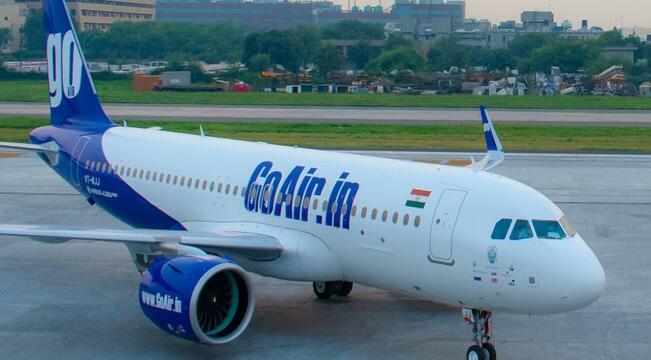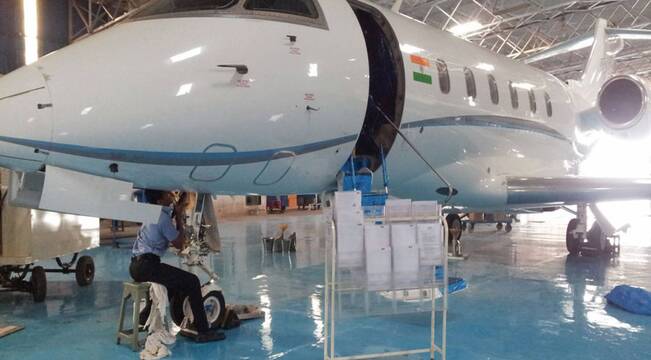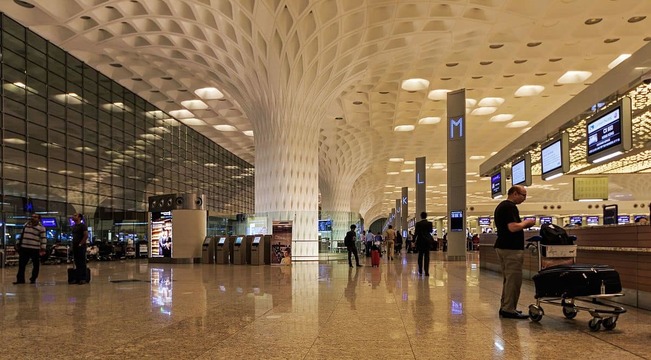Houston—Two NASA astronauts executed a spacewalk outside the International Space Station’s U.S. segment on Nov. 1 to replace a degraded trundle bearing assembly that enables the ISS’s outstretched solar panels to track the Sun to generate electricity.
Jasmin Moghbeli and Loral O’Hara, two first-time spacewalkers, ran out of time to accomplish the planned retrieval of a radio frequency group electronics box. But they were able to complete some preparations to ready the box for full recovery at a later date. The electronics box, which is to be returned to Earth for refurbishment, is part of a faulty communications antenna that was replaced during a December 2021 spacewalk.
The Nov. 1 excursion marked the fourth all-woman spacewalk among the total of 269 conducted by astronauts and cosmonauts since ISS assembly and operations began in December 1998.
The 6-hr., 42-min. spacewalk outside the seven-person orbital science laboratory began at 8:05 a.m. EDT and concluded at 2:47 p.m.
NASA astronauts Christina Koch—currently assigned to NASA’s Artemis II Moon mission planned for late 2024—and Jessica Meir conducted the first all-female spacewalk on Oct. 18, 2019. They also carried out the second and third all-female spacewalks on Jan. 15 and Jan. 20, 2020.
“Really nice job, highest-priority tasks completed,” NASA’s Mission Control communications lead Anne McClain told the spacewalkers as they reentered the ISS Quest airlock.
Moghbeli and O’Hara acknowledged the challenges and offered their thanks to the ground teams for their training and flight controllers for their support during the spacewalk.
Moghbeli is a U.S. Marine Corps lieutenant colonel, test pilot and aerospace engineer. O’Hara is an aerospace engineer with a background in operating undersea submersibles. They were both selected by NASA for astronaut training in 2017. Moghbeli launched to the ISS on Aug. 25 as commander of the four-person NASA SpaceX Crew-7 mission. O’Hara launched Sept. 15 with two cosmonauts aboard Russia’s Soyuz MS-24 crew transport capsule. Both are in the midst of the six-month Expedition 70 mission.
The latest ISS spacewalk also fell one day before the 23rd anniversary of the Nov. 2, 2000, start of a continuous human presence aboard the orbital lab by astronauts and cosmonauts representing the 15-nation, five-space agency partnership. NASA-led operations have been authorized by Congress to continue through 2030. This is intended to support an uninterrupted transition of NASA low-Earth-orbit human research and technology activities to multiple commercial space stations.
As the Nov. 1 spacewalk got underway, O’Hara moved to the port side of the ISS’s nearly 360-ft.-long solar power truss to replace the degraded trundle bearing assembly.
Meanwhile, Moghbeli moved to the port side of the truss to help prepare a support structure called a mast canister at the 2A solar power channel for the future installation of an ISS Roll Out Solar Array (iROSA) with the removal of a piece of hardware called an “H fixture.” NASA spacewalkers have so far equipped six of the orbital lab’s eight solar power channels with iROSAs between June 2021 and June 2023 to augment overall ISS solar power generation.
With her 2A power channel activities complete, Moghbeli joined O’Hara to finish removing the degraded trundle bearing assembly. It took O’Hara longer than planned to remove bolt fasteners from the protective cover. After lubricating an associated rotary joint, O’Hara was rejoined by Moghbeli to continue installation of the replacement trundle bearing assembly.
Moghbeli had moved away temporarily to realign a nearby Ethernet cable along the solar power truss.
O’Hara’s installation of the trundle bearing, its cover and thermal insulation came together nearly 5 hr. into their excursion. Moghbeli then moved to the radio frequency group electronics box clamp removal task.
With the spacewalk running behind schedule, NASA’s Mission Control suspended plans for Moghbeli to secure her feet onto the end of the ISS’s 57-ft.-long, multijointed Canadian robot arm in order to acquire full access to the electronics box for recovery. The robot arm was to be commanded from inside the ISS by European Space Agency astronaut Andreas Mogensen. The current ISS Expedition 70 commander was to be assisted by Japan Aerospace Exploration Agency astronaut Satoshi Furukawa.
O’Hara’s final task included moving along the port and starboard segment of the solar power truss to reconfigure a braking device on a Crew and Equipment Translation Aid (CETA). The CETA is a cart that hold tools and equipment that can be moved manually along the truss like a rail car by spacewalkers. O’Hara then rejoined Moghbeli to prepare the radio frequency group electronics box for a future retrieval.
As during an April 28 spacewalk by previous ISS crewmembers, the electronics box resisted efforts to free it up for eventual recovery and refurbishment.
The Nov. 1 spacewalk had initially been planned for Oct. 20, but was rescheduled for Oct. 30 and then Nov. 1. This was due to an Oct. 9 external coolant leak experienced by the ISS Russian segment Nauka multipurpose laboratory module’s backup Rassvet radiator. An Oct. 25 spacewalk by Russian cosmonauts Oleg Kononenko and Nikolai Chub managed to isolate the leak.
A second NASA spacewalk by O’Hara and Mogensen , once planned for Oct. 12, has been rescheduled for December, though a specific data has not been set. The spacewalk was to replace an external high-definition camera and collect samples from the external surface of the ISS to check for the presence of microorganisms.
During the Nov. 1 spacewalk, NASA announced that it has delayed the planned launch of the 29th NASA-contracted SpaceX Cargo Dragon resupply mission to the ISS from Nov. 5 to Nov. 7 at 9:16 p.m. EST. The Falcon 9 Launch from NASA’s Kennedy Space Center Launch Pad 39A was delayed to accommodate prelaunch processing of a 6,500-lb. cargo of crew supplies, ISS hardware and scientific research and technology development payloads, a NASA update said. according to the reports published in aviationweek.com .
An automated docking of the Cargo Dragon capsule is planned for Nov. 9 shortly before 12 p.m. EST.










